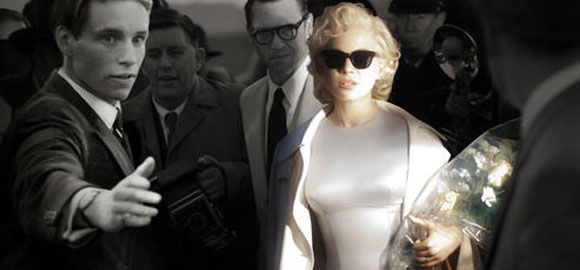Movie Review: My Week with Marilyn
An award-worthy turn by Michelle Williams almost saves an otherwise mediocre film.
In 1956, Marilyn Monroe traveled to England to act in The Prince and the Showgirl, a light, romantic farce that would unite Hollywood’s reigning sex goddess with actor-director Laurence Olivier.
By several accounts, production of The Prince and the Showgirl was fraught with difficulties and delays, mostly due to Monroe’s erratic behavior. One-time production assistant Colin Clark’s account of the tumultuous production, memorialized in two separate books, “The Prince, The Showgirl, and Me,” and “My Week with Marilyn,” form the basis for Simon Curtis’ aptly titled, My Week with Marilyn, a modest behind-the-scenes drama only made memorable by Michelle Williams’ award-worthy turn as the complex, troubled Monroe.
When we meet Colin Clark (Eddie Redmayne), a recent Oxford graduate and scion of a wealthy, aristocratic family (we know they’re wealthy and aristocratic by the massive size of the family estate), he’s eager to make his name in the motion picture industry. With only a family contact as aid, a determined Clark manages to obtain a position in Sir Laurence Olivier’s (Kenneth Branagh) production company as “third assistant director” (i.e., errand boy). Not surprisingly, Clark’s a peripheral figure, a passive observer, a background presence in his own story, only noticed when he’s needed for a task, no matter how minor or how menial. Over-awed by working on a film for the first time, Clark eventually gets tasked with finding paparazzi-free housing for Monroe (Williams) and her new husband, playwright Arthur Miller (Dougray Scott).
Working from Adrian Hodges’ adaptation of Clark’s books, director Simon Curtis depicts the classically trained Olivier as a stern, inflexible authoritarian, and Monroe as a deeply insecure actress. In addition to the barely seen or heard Miller, Monroe’s entourage includes her personal manager, Milton Greene (Dominic Cooper), and her Method acting coach, mentor, and de facto therapist, Paula Strasberg (Zoë Wanamaker). Frequent breakdowns, missed call times, flubbed lines, and Strasberg’s perpetual on-set presence creates on- and off-set friction that threatens to halt or derail the production of The Prince and the Showgirl. With her relationship with Miller already fraying, Monroe relies on prescription pills to help her regulate her moods and sleep.
Clark eventually sidesteps the passive observer role and becomes the center of his own story, but he never develops beyond a self-indulgent, privileged twenty-something white male with a shallow crush on Monroe. Curtis and Hodges give Clark a more believable romantic interest in Lucy (a de-glamorized Emma Watson), a costume fitter, but it only serves as a time-filling distraction before Clark gets to spend the better part of a week with Monroe as her chaperone after Miller’s abrupt departure for the states. The Clark-Monroe scenes feel like fantasy or wish-fulfillment (insert obligatory “based on a true story” qualification here) and despite Curtis’ semi-herculean efforts to add visual interest through composition, lighting, and camera movement, ultimately meaningless (except for Clark, of course).
When Williams appears on screen as Marilyn, however, My Week with Marilyn’s plot and character deficiencies seem less important. As Monroe, Williams is never less than mesmerizing. It’s less about duplicating or imitating Monroe’s physical appearance, movements, gestures, or speech patterns, all of which Williams handles with remarkable effortlessness, but more about Williams impressive ability to embody Monroe’s public persona as a sex goddess and glamorous movie star and Monroe’s troubled private individual where her insecurities, fears, and anxieties expressed themselves. The irreconcilable conflict between the “real” Marilyn and the “other” Marilyn led to a fading career and Monroe’s premature death six years later.
Showtimes and Tickets






